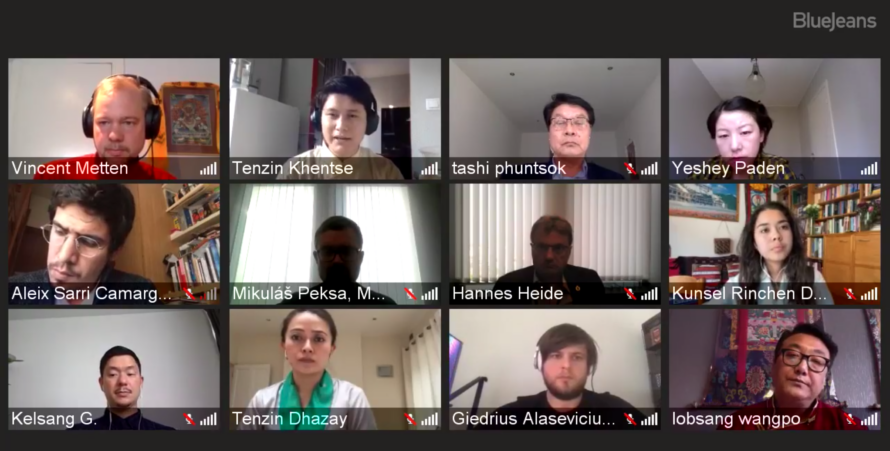
On 19 April 2021, a virtual European Tibet Lobby Day was co-organized by the International Campaign for Tibet and the European Parliament’s Tibet Interest Group. Participants from six countries in Europe suggested concrete ways in which the European Parliament could further increase its support for the Tibetan people.
The participants were six Tibetans living in six European countries: Ms. Kunsel Rinchen Dorjee from the Netherlands, Ms. Tenzin Dhazay from Ireland, Ms. Yeshey Paden from Sweden, Mr. Tenzin Khentse from Poland, Mr. Kelsang Gonnot from France and Mr. Lobsang Wangpo from Belgium.
The event started in the morning with a briefing session during which participants were given an update on the human rights situation in Tibet, EU-China relations and the state of Tibetan advocacy and activism, and agreed on the main topics and messages they wanted to share with European parliamentarians.
Participants then reconvened in late afternoon for a special online meeting of the European Parliament’s Tibet Interest Group hosted by its chair Member of the European Parliament (MEP) Mikuláš Peksa (Czech Republic, Greens/EFA). MEPs Hannes Heide (Austria, S&D), Aušra Maldeikienė (Lithuania, EPP), and Carles Puigdemont, Clara Ponsati and Antoni Comin (Catalonia, NA) also took part or were represented.
After briefly introducing themselves, the 6 lobbyists of the day each gave a brief overview on a specific Tibet-related issue – namely freedom of religion and the succession of the Dalai Lama, access to Tibet, education and language, environmental issues, self-immolations and Chinese influence in Europe. They also suggested concrete ways in which the European Parliament could further increase its support for the Tibetan people- including passing a resolution condemning Chinese interferences in the succession of the Dalai Lama or calling for the release of Tibetan arbitrarily detained for their environmental activism, such as Anya Sengdra. “We talked about the fact that there is no freedom of religion, no freedom to learn your own language, that nomads are not able to have their grassland, that the environment in Tibet is being harmed… In short, the whole lives of Tibetans are affected (…) Tibet is suffering (…) 157 people have put themselves on fire just with this hope that we people who live outside in the free world would do something about it; I think we should not let their hope down and we should do something about it,” Yeshey Paden appealed.
MEPs welcome this opportunity to exchange directly with Tibetans: “Sometimes you read about things, and it’s not the same than listening to you; you are Tibetans, you know what it’s like to fight for your nation, to fight for your culture, to fight for your freedoms, and to do it from abroad”, the parliamentary assistant to the three Catalonian MEPs Aleix Sarri i Camargo noted. “I think it’s very positive that there is a new and young generation of Tibetans in exile dealing passionately with Tibetan issues, and I wish you all your best for your work for the Tibetan cause” Hannes Heide added.
They also positively to the ideas raised; on the issue of the succession of the Dalai Lama for example, Mikuláš Peksa for example said “No state should define who should be the successor of the Dalai Lama (…) how could the EU state anything else?”, Mikuláš Peksa said, adding that the adoption of a European Parliament resolution condemning Chinese interferences in the process was something realistic in the near future.
The meeting was concluded by Tashi Phuntsok, Head of the Office of Tibet in Brussels, who thanked the Tibetans participants for their commitment to continue the Tibetan struggle for justice and freedom in exile.
The Lobby Day was organized entirely online this year, as the ongoing pandemic and sanitary restrictions made it impossible for participants to travel to Brussels for in-person meetings with MEPs as is usually the case.
ICT Quote by Vincent Metten, EU Policy Director
“Tibet Lobby days create a unique opportunity for young Tibetans from different European countries to directly share their personal experience and stories with members of the European parliament and to provide concrete recommendations for the EU on Tibet. The motivation and commitment of this young group of Tibetans show that a new generation of Tibetans born in exile is ready to continue the struggle for freedoms and fundamental rights for the six million brothers and sisters that live in Tibet.”